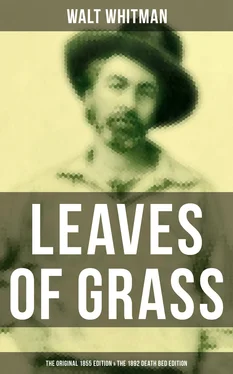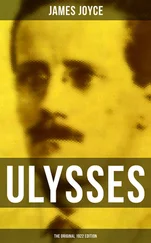1 ...7 8 9 11 12 13 ...29 In walls of adobe, in canvass tents, rest hunters and trappers after their day’s sport.
The city sleeps and the country sleeps,
The living sleep for their time . . . . the dead sleep for their time,
The old husband sleeps by his wife and the young husband sleeps by his wife;
And these one and all tend inward to me, and I tend outward to them,
And such as it is to be of these more or less I am.
I am of old and young, of the foolish as much as the wise,
Regardless of others, ever regardful of others,
Maternal as well as paternal, a child as well as a man,
Stuffed with the stuff that is coarse, and stuffed with the stuff that is fine,
One of the great nation, the nation of many nations -- the smallest the same and the largest the same,
A southerner soon as a northerner, a planter nonchalant and hospitable,
A Yankee bound my own way . . . . ready for trade . . . . my joints the limberest joints on earth and the sternest joints on earth,
A Kentuckian walking the vale of the Elkhorn in my deerskin leggings,
A boatman over the lakes or bays or along coasts . . . . a Hoosier, a Badger, a Buckeye,
A Louisianian or Georgian, a poke-easy from sandhills and pines,
At home on Canadian snowshoes or up in the bush, or with fishermen off Newfoundland,
At home in the fleet of iceboats, sailing with the rest and tacking,
At home on the hills of Vermont or in the woods of Maine or the Texan ranch,
Comrade of Californians . . . . comrade of free northwesterners, loving their big proportions,
Comrade of raftsmen and coalmen -- comrade of all who shake hands and welcome to drink and meat;
A learner with the simplest, a teacher of the thoughtfulest,
A novice beginning experient of myriads of seasons,
Of every hue and trade and rank, of every caste and religion,
Not merely of the New World but of Africa Europe or Asia . . . . a wandering savage,
A farmer, mechanic, or artist . . . . a gentleman, sailor, lover or quaker,
A prisoner, fancy-man, rowdy, lawyer, physician or priest.
I resist anything better than my own diversity,
And breathe the air and leave plenty after me,
And am not stuck up, and am in my place.
The moth and the fisheggs are in their place,
The suns I see and the suns I cannot see are in their place,
The palpable is in its place and the impalpable is in its place.
These are the thoughts of all men in all ages and lands, they are not original with me,
If they are not yours as much as mine they are nothing or next to nothing,
If they do not enclose everything they are next to nothing,
If they are not the riddle and the untying of the riddle they are nothing,
If they are not just as close as they are distant they are nothing.
This is the grass that grows wherever the land is and the water is,
This is the common air that bathes the globe.
This is the breath of laws and songs and behaviour,
This is the the tasteless water of souls . . . . this is the true sustenance,
It is for the illiterate . . . . it is for the judges of the supreme court . . . . it is for the federal capitol and the state capitols,
It is for the admirable communes of literary men and composers and singers and lecturers and engineers and savans,
It is for the endless races of working people and farmers and seamen.
This is the trill of a thousand clear cornets and scream of the octave flute and strike of triangles.
I play not a march for victors only . . . . I play great marches for conquered and slain persons.
Have you heard that it was good to gain the day?
I also say it is good to fall . . . . battles are lost in the same spirit in which they are won.
I sound triumphal drums for the dead . . . . I fling through my embouchures the loudest and gayest music to them,
Vivas to those who have failed, and to those whose war-vessels sank in the sea, and those themselves who sank in the sea,
And to all generals that lost engagements, and all overcome heroes, and the numberless unknown heroes equal to the greatest heroes known.
This is the meal pleasantly set . . . . this is the meat and drink for natural hunger,
It is for the wicked just the same as the righteous . . . . I make appointments with all,
I will not have a single person slighted or left away,
The keptwoman and sponger and thief are hereby invited . . . . the heavy-lipped slave is invited . . . . the venerealee is invited,
There shall be no difference between them and the rest.
This is the press of a bashful hand . . . . this is the float and odor of hair,
This is the touch of my lips to yours . . . . this is the murmur of yearning,
This is the far-off depth and height reflecting my own face,
This is the thoughtful merge of myself and the outlet again.
Do you guess I have some intricate purpose?
Well I have . . . . for the April rain has, and the mica on the side of a rock has.
Do you take it I would astonish?
Does the daylight astonish? or the early redstart twittering through the woods?
Do I astonish more than they?
This hour I tell things in confidence,
I might not tell everybody but I will tell you.
Who goes there! hankering, gross, mystical, nude?
How is it I extract strength from the beef I eat?
What is a man anyhow? What am I? and what are you?
All I mark as my own you shall offset it with your own,
Else it were time lost listening to me.
I do not snivel that snivel the world over,
That months are vacuums and the ground but wallow and filth,
That life is a suck and a sell, and nothing remains at the end but threadbare crape and tears.
Whimpering and truckling fold with powders for invalids . . . . conformity goes to the fourth-removed,
I cock my hat as I please indoors or out.
Shall I pray? Shall I venerate and be ceremonious?
I have pried through the strata and analyzed to a hair,
And counselled with doctors and calculated close and found no sweeter fat than sticks to my own bones.
In all people I see myself, none more and not one a barleycorn less,
And the good or bad I say of myself I say of them.
And I know I am solid and sound,
To me the converging objects of the universe perpetually flow,
All are written to me, and I must get what the writing means.
And I know I am deathless,
I know this orbit of mine cannot be swept by a carpenter’s compass,
I know I shall not pass like a child’s carlacue cut with a burnt stick at night.
I know I am august,
I do not trouble my spirit to vindicate itself or be understood,
I see that the elementary laws never apologize,
I reckon I behave no prouder than the level I plant my house by after all.
I exist as I am, that is enough,
If no other in the world be aware I sit content,
And if each and all be aware I sit content.
One world is aware, and by far the largest to me, and that is myself,
And whether I come to my own today or in ten thousand or ten million years,
I can cheerfully take it now, or with equal cheerfulness I can wait.
My foothold is tenoned and mortised in granite,
I laugh at what you call dissolution,
And I know the amplitude of time.
I am the poet of the body,
And I am the poet of the soul.
The pleasures of heaven are with me, and the pains of hell are with me,
The first I graft and increase upon myself . . . . the latter I translate into a new tongue.
I am the poet of the woman the same as the man,
And I say it is as great to be a woman as to be a man,
And I say there is nothing greater than the mother of men.
I chant a new chant of dilation or pride,
Читать дальше












